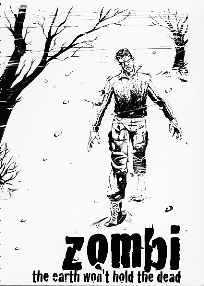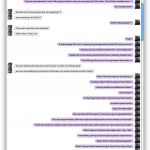Alternate Reality Games (or Layered Reality Games) are going to be big.
When someone mentions ARGs, I always think of Total Recall (the film) [thanks Eamon]. The protagonist takes a virtual holiday which interweaves the real world with a spy conspiracy in his head (or is it?). Everything in his life becomes involved in the game – a girl he picks from a menu becomes his lover, his wife (with whom he has difficulties) becomes a killer spy, his co-workers seem to be sleeper agents designed to keep him quiet and the whole movie is left for you to wonder is it real or has he been placed in a sleeper community after some deep cover espionage?
Deep Cover Espionage, of course, leads us on to The Prisoner. Progressive and not a little confusing, it’s propensity for involved games and the inability of the protagonist to leave the game does indeed suggest it’s an ARG gone bad. The game element can be seen every episode
Michael Douglas played “The Game” in this 1997 film where an ARG went wrong and involved all sorts of violence. I kept wondering during the movie whether or not the twist in the tail would be I expected. Would everything in the film just be part of the Game? Or did the Game start and his actions make it spiral out of control?
Hollywood loves disasters. Look at Jurassic Park. Never have I seen science maligned as much as in that movie. The same is true for ARGs. It’s a new idea so while they use ARGs in their marketing, they’re also happy to point out how these things can go wrong.
Why is there such a need to have ARGs go wrong? Is it because the idea of story involving us must mean action, death and violence at every turn? Why can’t the fun of the game just be in the game? Possibly because most games would involve messages on a phone or computer and wouldn’t really involve guns or sex – which, at the end of the day, seem to be what sells movies. And a little too much sex and violence in an ARG would probably get you in trouble with your partner.
Mission Impossible enjoyed the use of elaborate reality games when they would convince enemy agents they were in their home territory or being held far from home in order to confuse and disorientate them. Once the information had been gained, the elaborate hoax dissolved leaving the mark feeling very much in the dark.
Viral campaigns for movies such as Cloverfield and A.I. worked really well to weave a pattern around the events in the movies. This makes you wonder though – there’s obviously a class of writer that is now being created in the industry – someone who’s job it is to weave elaborate ARG plots which in itself is a very specialist skill. It would indeed be a challenge I would relish – a project for another day definitely.
Live Action Role Play (LARP) and Murder Mystery Parties represent a limited ARG. The environment you can move around is limited, the people you encounter will all be in on the game. There was an urban legend I was told about a LARP group that had hired a hotel ballroom and some extra rooms for a “Victoriana” game. During the evening, some guests from the hotel who were not involved in the game, wandered onto the “set”. Interacting with the Victoriana gamers had the guests convinced they had walked into another world. LARP isn’t all about foam boffer weapons and men with masks wandering around damp forests – it’s about playing a role in a game but using the whole body.
Treasure Hunt was a Channel 4 game show which ran for nearly a decade with the winning formula of clues, a studio research team, a helicopter and a pretty girl. If the contestants managed to guide the ‘runner’ to the treasure using the clues, then they would win a cash prize and all of this was against the clock.
This is related to Geocaching, an outdoor treasure-hunting game where the participants use a GPS device (like a modern mobile phone) and search out hidden treasure, usually a logbook and toys or trinkets. According to wikipedia, over 800,000 geocaches, over 100 countries across seven continents are registered on various websites.
The Adventure Game was another ARG-related game show, aimed at children, from the BBC during the early-mid eighties. The story was that the contestants had travelled to the planet ‘Arg’ (was that prescient?) – the game seemed, from the viewer point of view, internally consistent and the contestants played along with the game format. The Vortex task at the end of every episode, also presented a unique perspective – rather than being a physical or mental task, it was a tactical task based on the presence of an invisible destructive force on the game grid – a force that could only be seen by the television viewers.
Knightmare came pretty much after the Adventure Game where a ‘blindfolded’ child was led around a maze by three friends and had to interact with various physical tasks and puzzles. The environment was a mix of physical sets and computer imagery (using Chromakey). Wikipedia states that Knightmare was conceived by taking the computer game “Atic Atac” from the ZX Spectrum and ‘revolutionising’ it using television. Somewhat ironic.
Flash Mobs would be another nod to Alternate Reality Games – when a mob of zombies descends on a mall or participants engage in a massive and worldwide pillow fight, there is a ‘game’ element that is being used. The activity is usually coordinated by the internet and can bring a lot of attention. The concept itself seems to have originated in a Larry Niven story “Flash Crowd” from 1973.
De Profundis is a final example of an Alternate Reality Game. It’s a story-telling game involving the posting of letters from participant to participant. De Profundis has also been played using email or blog posts across the internet. It ties literary story-telling to the Lovecraftian Cthulhu Mythos – encouraging participants to describe their descent into madness and the occult in flowery prose fitting the style of the genre. Described as more of a psychodrama than a role-playing game and certainly having more in common with creative writing than table-top games:
In De Profundis we don’t declare to the Game-master that we are going to do a library search. We go to a real library ourselves to look for vague comments and hints which cause shivers of cosmic terror. We have all the books of all the libraries in the world to look through and fish for secrets and hidden, disguised truths.
So what?
ARG’s tie together several things. They bring the ability to source material from the Internet (giving a virtually unlimited amount of virtual scenery to the Game) and then link that to a location (hyperlocality) using a GPS and a time (temporality) in order to weave together puzzles. There’s also a virtually unlimited amount of interactivity. We have to answer questions like whether ‘participants’ are also ‘creators’ within the game. That’s something that really interests me with my background.
I have also been contributing to (viewing mostly) the 4IP social network (hosted on ning) called ’38 minutes’. In particular the area that interests me on 38minutes most is “Alternate Reality Gaming”. I’m sufficiently interested in ARGs that I
intend to start a Masters degree to study them. I just need to flesh out the concept and learn to program computers!
Over the next few blog posts I’ll examining the following steps.
Step Zero: The Concept
Step One: The Engine
Step Two: The Game Rules
Step Three: The Plot
Step Four: Profit!






